Håkan Sävlind didn’t plan on a career in coffee—it found him. What started as an interest and then a temporary job quickly turned into a full-blown, wholesome career. Now, at 29, Håkan is an inspiring member of the Swedish specialty coffee scene, managing the iconic Café Pascal, co-founding Nordic Brew Lab, and delivering brewing tips to the wider community through The Brew Journal.
Håkan is not just serving delicious coffee—he’s building spaces where people can learn, connect, and grow. From competition lots to curated gear and workshops, Håkan’s approach combines precision, hospitality, and a deep respect for where each guest is on their coffee journey.
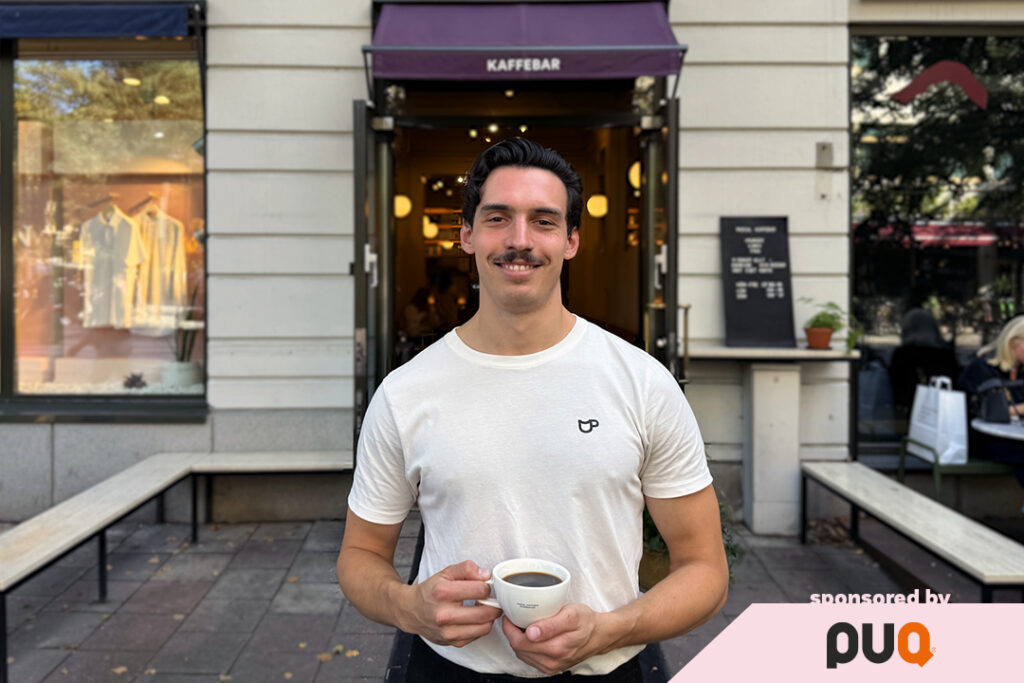
Håkan, what is your first memory with coffee?
My earliest memory is from when I was about 9 years old, and we were having Swedish ‘’fika’’ at a friend’s place – their parents had baked some cinnamon buns and brewed filter coffee. Good old-fashioned batch brew, with dark roast beans and way too much coffee to water ratio, gives that “strong and bold” flavour Swedish people claim to enjoy so much. My friend said that he liked coffee with milk and sugar, and was preparing one for himself, so I also gave it a try! I didn’t really like it, so I kept adding more and more sugar until it was drinkable. I was not intrigued, so it took a couple of years before I started drinking coffee.
In Sweden, coffee is like a commodity. It is free in many schools and workplaces, so there was an abundance of filter coffee, which was hard to say no to, especially when having exams and feeling the energy go down!
What inspired you to pursue a career in the coffee industry, and how did you get started?
My career wasn’t intentional – it just happened, and I never would’ve imagined that I’d have a caréer in the coffee industry. Before coffee, I was studying audio engineering & music production, which was my biggest passion before 2018. After graduating from that, I realised that I didn’t want to work with music, but rather keep it as a hobby and do something else to pay my bills.
Coffee as a career never crossed my mind, but I was open to working with it as a temporary job. So the summer of 2018, I graduated and started looking for summer jobs right away, and I saw that a big Swedish coffee chain – Espresso House – was looking for employees.
Back then, I had no real interest in coffee, and I even quit drinking it completely, because I found that I felt better by not drinking coffee… Ironic huh? Although I had quit drinking coffee, I had seen lots of videos about baristas pouring latte art, which always intrigued me. How did I even stumble across those videos?
Well, that same friend who introduced me to filter coffee with milk many years prior, also mentioned in his teens that he truly enjoyed caffe latte. I didn’t really understand what it was, because it was coffee with milk, but not filter coffee, so I had to search for it on the web and stumbled across videos on how to steam milk for better latte art. It looked so fun and interesting to me, and I wanted to try it. Me and a friend working at a café even discussed if I could come over after closing, to try to steam milk and pour latte art… So, it made sense for me to apply for a summer job at Espresso House, because I’d get to make some money, and pour latte art all day! (If I got the job).
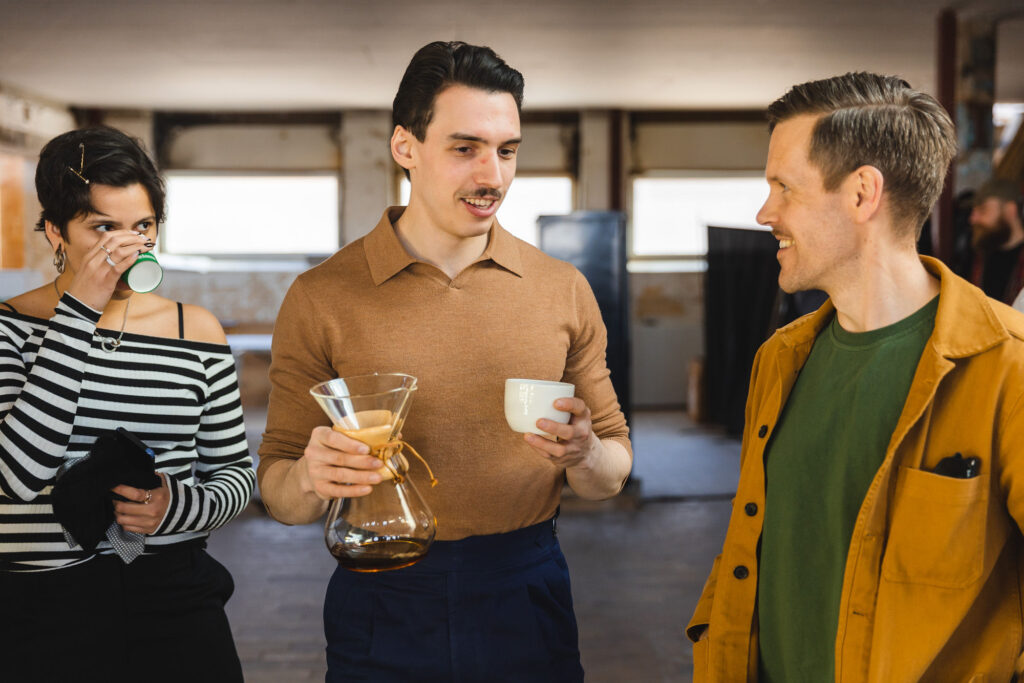
The real shift happened when I took a barista course, which was part of Espresso House’s internal training. We were taught about origins, processing, and roasting, which was then ended with a cupping, and we tried a bunch of different coffees – on that table, there was a Natural Ethiopian from Guji, which completely changed my life. It was so different to any coffee I ever tried, because it tasted sweet, like blueberries, it had its unique flavour, and it wasn’t bitter – it was tasty on its own! It opened my eyes.
From that point, I got obsessed with trying coffee from different origins, processes, etc. to discover the different unique flavour profiles that each origin could offer, because now I suddenly felt like each coffee was telling its own story – but only when roasted and brewed the right way. It didn’t take long until I bought all the coffee books I could find, and watched all the YouTube videos available about coffee. After my shifts at work, I even went to other coffee shops and brought my brewers and coffees for the baristas to try, so we could evaluate the coffees together!
I quickly worked my way up in the company because I became so obsessed with improving with coffee, and it suddenly became a passion and a career! It didn’t take long until I was in charge of training all baristas within a certain district in Stockholm.
Tell us a bit about your coffee projects.
My main job is running one of the locations of Café Pascal, which is internationally known as one of the first specialty coffee shops in Stockholm (apart from Drop Coffee, of course). Pascal started as a café, and is now an operation with 4 locations, including our own roastery, where we focus on a wide range of clean, washed coffees, the occasional fermented or experimental lot, and nowadays, we even do competition lots for when we compete in like Brewers Cup, Barista Championship, etc.
Although people know me as the coffee expert, I’ve handed over the role of head barista to someone else, and I keep running the shop as a manager. Her name is Clara and she is a very skilled, dedicated and passionate barista. I think it’s important to give people a little push and help them grow by giving them more responsibility and support along the way! I think that’s what made me so successful so far, taking on new challenges. I remember in 2020 when I got the job as head barista at Pascal, I had a really big imposter syndrome and was worried that I wasn’t qualified enough, but once I had that role, I made sure to learn every day until I felt qualified enough!
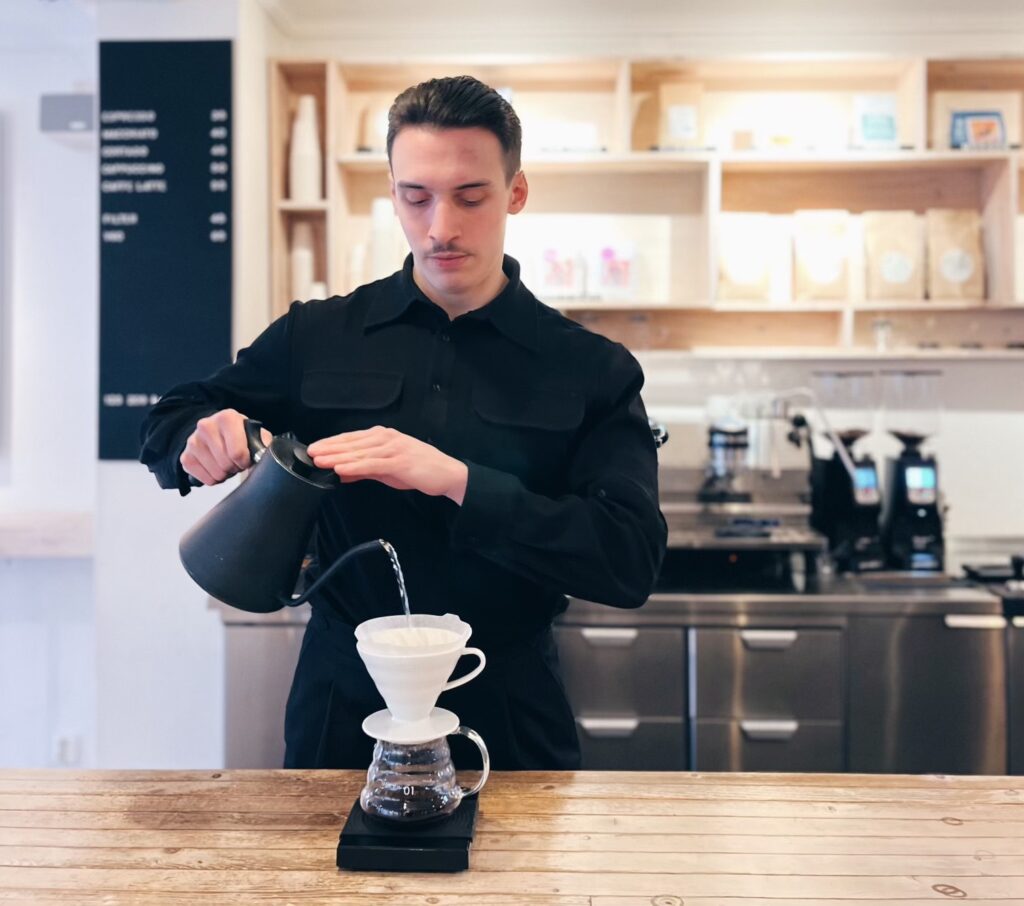
My most recent project is Nordic Brew Lab, which I run together with Pierre Tymms. NBL is our answer to what we find the industry is lacking. You see, there’s no go-to coffee hub where you can find everything you need, beans, gear and brewed coffee. Either you go to an amazing café that doesn’t sell gear, or you find gear at a random store for kitchen appliances that doesn’t serve any coffee, or offer any helpful guidance on what to choose or how to get the most out of your gear.
In Nordic Brew Lab, we offer all of that under one roof – Curated gear, coffee experiences, workshops, educations and most importantly – guidance on how to find the right gear for you and how you get the most out of it. Nordic Brew Lab is all about building long-term relationships and giving back to the coffee community, so when you visit us, you’re not just a number – but you become part of a community! The entire concept kind of builds on the fact that everyone goes through a “journey of discovery” when stumbling across specialty coffee, and we’re here to meet you where you are and guide you onwards on your journey
My third project, also run together with Pierre Tymms for almost 2 years now, is The Brew Journal, which is a weekly email newsletter about brewing better coffee at home. In short, we provide short-form, easy-to-read content to help people brew better coffee at home. In each edition, we include a new weekly coffee to discover, short articles about gear, tips & tricks, deep dives, origins, barista school, quizzes and more.
We noticed that lots of home-brewers are working in office jobs or IT, so we want to become the email that everyone is looking forward to getting! There are lots of advanced research papers and videos out there, and we essentially summarise them, make them short and understandable for the average home brewer.
What kind of experience do you want your customers to have when they visit your places?
Regardless of whether they visit Pascal or Nordic Brew Lab, I want my guests to feel seen, and that what we provide matches their expectations. Not only that, but they should feel that the people working are so friendly, that they would want to build a personal connection and regularly come back to us.
Now, Pascal is a café and that’s not just about coffee experiences, but delivering food, pastries and drinks with speed – there we focus more on checking on how the guest is feeling, are they having a good day etc and then have them leave with a smile, even if it’s just a 60 second interaction.
With Nordic Brew Lab, we have a longer time-frame to serve the customers, and just like in a café, we want them to feel seen and heard, but there we also want the customer to feel like they’re involved in the preparation of the coffee, which is why they are seated right in front of the bar. They should feel that Nordic Brew Lab is the place to ask anything about coffee and get a proper, helpful answer back. After all, we want the customer to feel safe that Nordic Brew Lab is the place to go, whether it’s for drinking coffee, buying gear or learning.
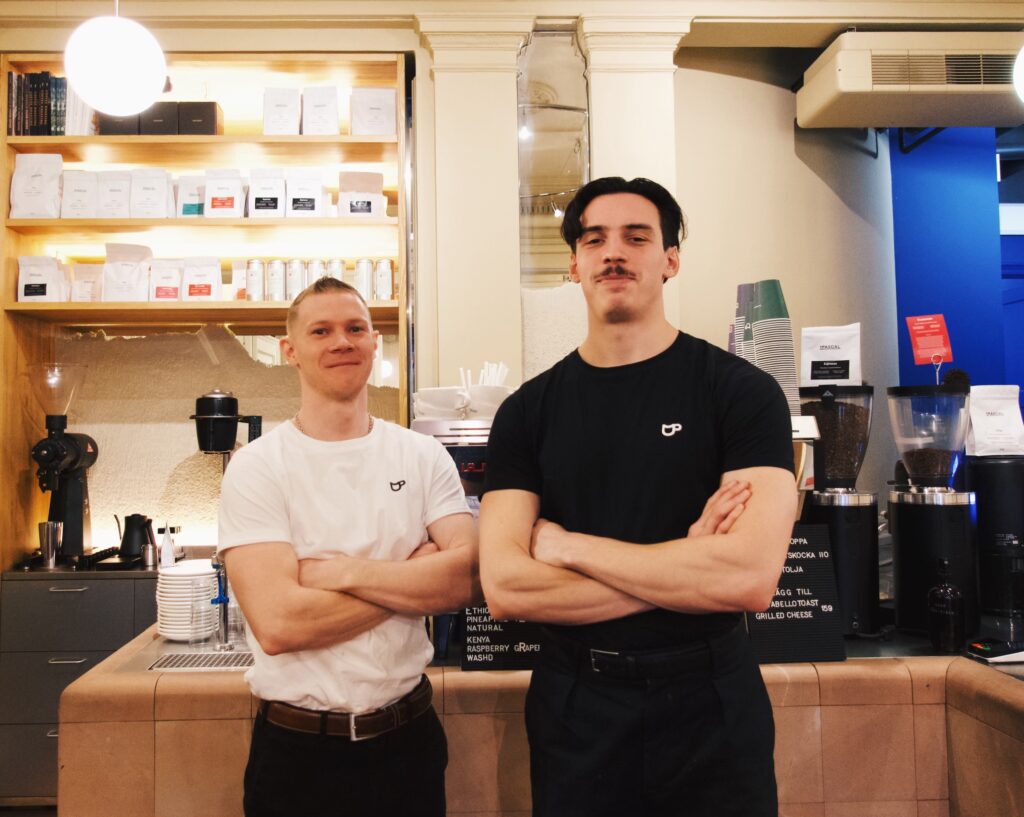
What new quality do you bring with Nordic Brew Lab?
With Nordic Brew Lab, we want each person to feel like they can count on us to be a part of their coffee journey, regardless of whether they’re looking for tools, gear or eye-opening coffee experiences. At NBL, we optimise every step of the brew-chain to reach the highest potential of each coffee, which includes using custom-made brew water, extract-chilling, sibarist-filters, WDT-tools, and much more.
All of the tools we use are available on our retail shelf, and our goal is that you should be able to re-create this experience at home, if you really want to. We’re not a café, and we’re not looking to become the place where you get your morning coffee on the go. Instead, we’ve chosen to have very limited seats, so that each person buying coffee gets fully immersed in a coffee experience, where we present the coffee, processing and what we’ve done to make it as tasty as possible.
In this moment, the guest will be able to ask any questions they like, which is important for us. Think of us like a knowledge hub that provides experiences and all the tools and guidance you need to brew the best possible coffee at home.
What kind of community do you hope to build around your projects, and how do you plan to foster that sense of community?
For me, the magic about coffee is the community it builds – people of all ages, occupations, hobbies, world-views, lifestyles, and so on can get together over a cup of coffee – and this is the red line I want to shine through all my projects. Regardless of your experience, you should not only feel seen, but my projects are meant to keep that curiosity and discovery of coffee alive and thriving, and that is heavily community-based.
So for me, the most important thing to foster the community is to host events, workshops, competitions and educations that target a mix of different people – the goal isn’t that people just come, have fun and learn something – but the events are meant for people that are at different stages of their coffee journey to connect, build friendships and feel that they are really part of something bigger.
It’s all about the human connection! I think something that has gone a long way is that we’re not afraid of using very simple, everyday language to make even the average person understand what we’re talking about, because sometimes, using too advanced terms can scare people off and make them feel excluded.
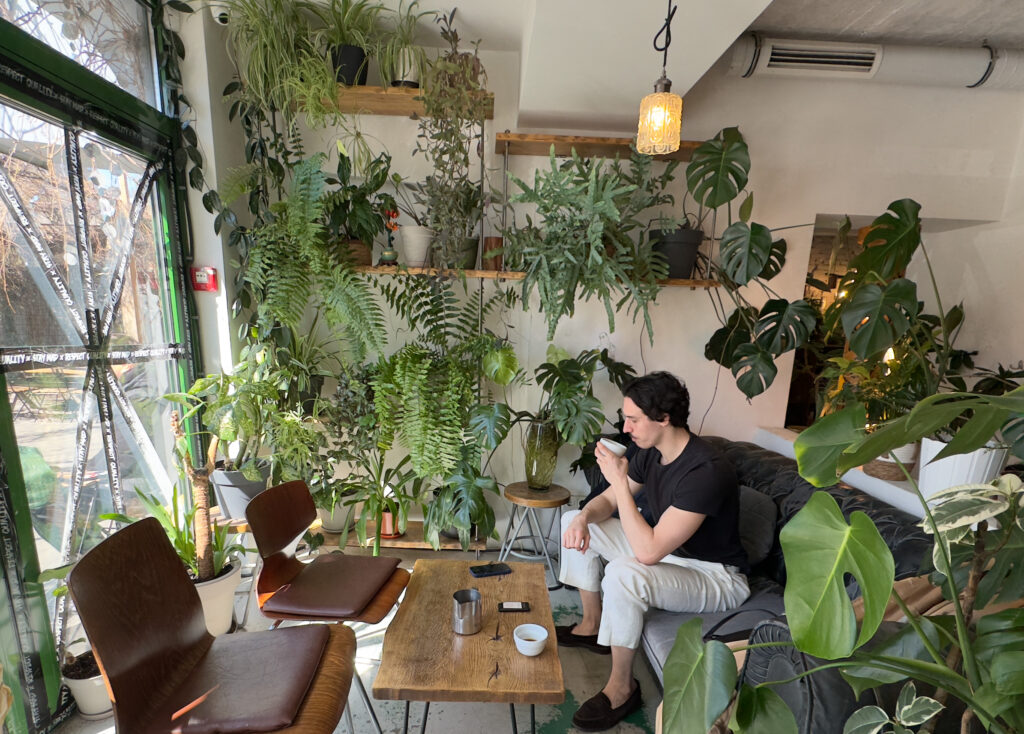
How do you stay motivated and inspired to keep improving your coffee-making skills?
Well, depends on what you mean! Part of brewing coffee is the actual brewing, and another part is to communicate what you’ve brewed in the most suitable way, depending on the situation you’re in!
My biggest source of inspiration that pushes me to improve is coffee competitions. Each competition is a long process of sourcing the right coffee, finding the right roast, choosing the brew setup that will highlight the best qualities of that coffee, and, of course, preparing for a presentation and planning everything so you can give the judges an unforgettable coffee experience.
Regardless of how it goes, one usually comes back to the bar with new insights, ideas and techniques that improve your workflow, help you brew tastier coffee or even improve your speaking skills! For me personally, I love taking that competition experience back and re-package it so I can help other people, outside of the industry, experience this themselves – this means using the same, rare competition coffees, freeze-distilled milk, custom-made water, etc. People are just so blown away by these experiences, and it really motivates me to keep going.
In this example, I’d serve the same coffee regardless of whether the group is completely new to specialty, or experienced baristas – what would change is the words I use and how in-depth I go into the coffee, and I find it very inspiring to re-package this experience to different audiences.
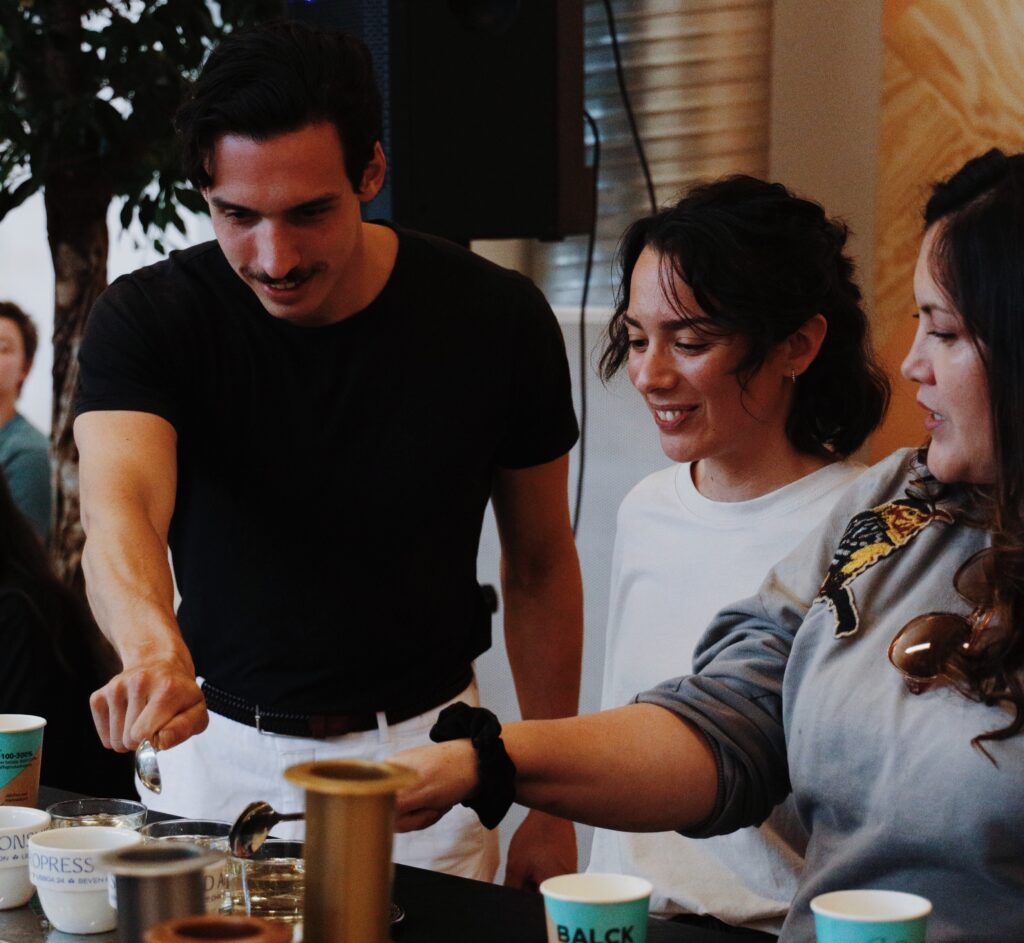
What are the current trends in cafes in your region? Are there any trends you promote yourself and would like to see more often in other places?
Now, keep in mind that Sweden is a bit behind with coffee bars compared to cities like Copenhagen, London and Barcelona. One trend I noticed in Stockholm right now is to offer two choices on espresso – usually one ‘’classic’’ and one more bright and fruity, like a washed Ethiopian. Another trend I see is that more and more places are starting to catch up with offering pour-over coffee, which has previously been ultra-rare in Stockholm.
And the most recent trend is water-optimisation, it’s becoming more common now to use advanced RO systems for water filtration, to get full control of the water quality for coffee brewing. Something that I’ve been pushing behind the bar, although not on a daily basis – is to serve ultra-rare competition coffees, with custom-made brew water using purified water combined with Apax Lab droplets.
Another one is the use of freeze-distilled milk, or Double Milk, at our bar, just like in the competitions! The biggest trend I think we’ll see in Stockholm is to stop serving cold brew and do cold drip instead! We just started with this in Pascal and believe that other cafés will follow when tasting the difference!
What do you think is the most important quality for a barista to have, and why?
I think the most important quality for a barista to have is to be hospitable and service-minded. Regardless of how good the coffee you make, it’s the social interaction and the experience that will determine if a customer wants to come back or not. It’s key to meet people where they are and provide service from there.
Another one is curiosity, to keep trying new approaches when it comes to brewing, grinding, sourcing, etc. This way, you keep pushing yourself and your workplace forward. I’m very open with the fact that I’d rather go to a coffee shop with terrible coffee and amazing service than have an amazing coffee with terrible service.
Although we’re serving a drink, there’s so much more around the drink itself, which makes the social part even more important.
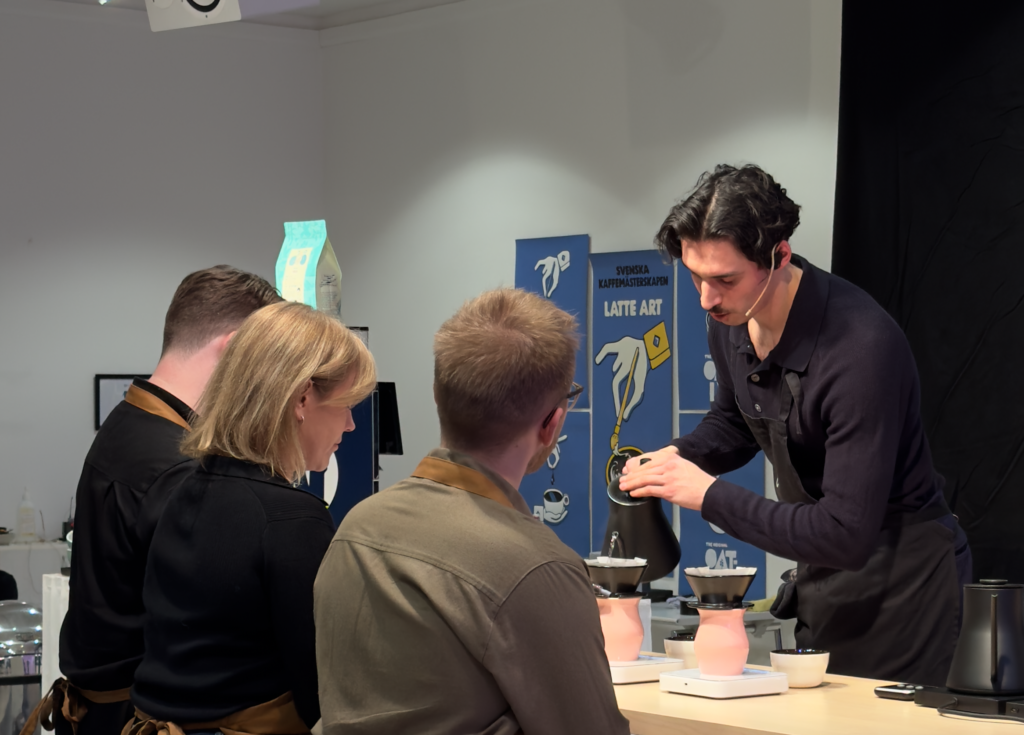
What are some common misconceptions about our industry that you’ve encountered, and how do you address them?
I think the biggest misconception is that people don’t understand that working with coffee means more than just brewing coffee; in a café, it means washing dishes, throwing trash, taking care of customers, preparing food, cleaning etc. People often have a romanticised image that you just brew coffee and have fun all day, which is not the case!. This is the first thing I address when doing job interviews!
The second misconception is that specialty coffee is automatically better for the environment and the workers than commodity coffee. I’m against this narrative because many baristas sit on a high horse with this position, but coffee is more nuanced than that.
First of all, only 3-5% of the global coffee market is specialty coffee, and second, it’s not physically possible to replace commodity coffee with high-altitude, single-origin specialty coffee – there’s not enough space! There are commercial roasters with big buying power that set up long-term contracts with producers, that for the producer is sustainable, both economically and agriculturally, using only organic fertilisers and no pesticides, and even helps their business become profitable and growing.
On the other hand, there are specialty coffee producers that spray their crops with pesticides and then ship their coffee using air freight. Instead of pointing fingers at everything outside of specialty, understand that specialty and commodity coffee are part of the same market, but different ends. In the end, a farmer will benefit more from a commercial roaster buying 1 tonne of coffee from them, compared to a micro-roastery buying 12kg of Gesha from their farm.
I’m not making the case that commodity coffee is all good and there’s nothing to improve either, but just important to point out that there are big brands out there doing good, even though their coffee isn’t labelled specialty. Specialty is very niche, and we’re all early adopters of it – we won’t grow bigger by hating, but by being respectful and leading by example.
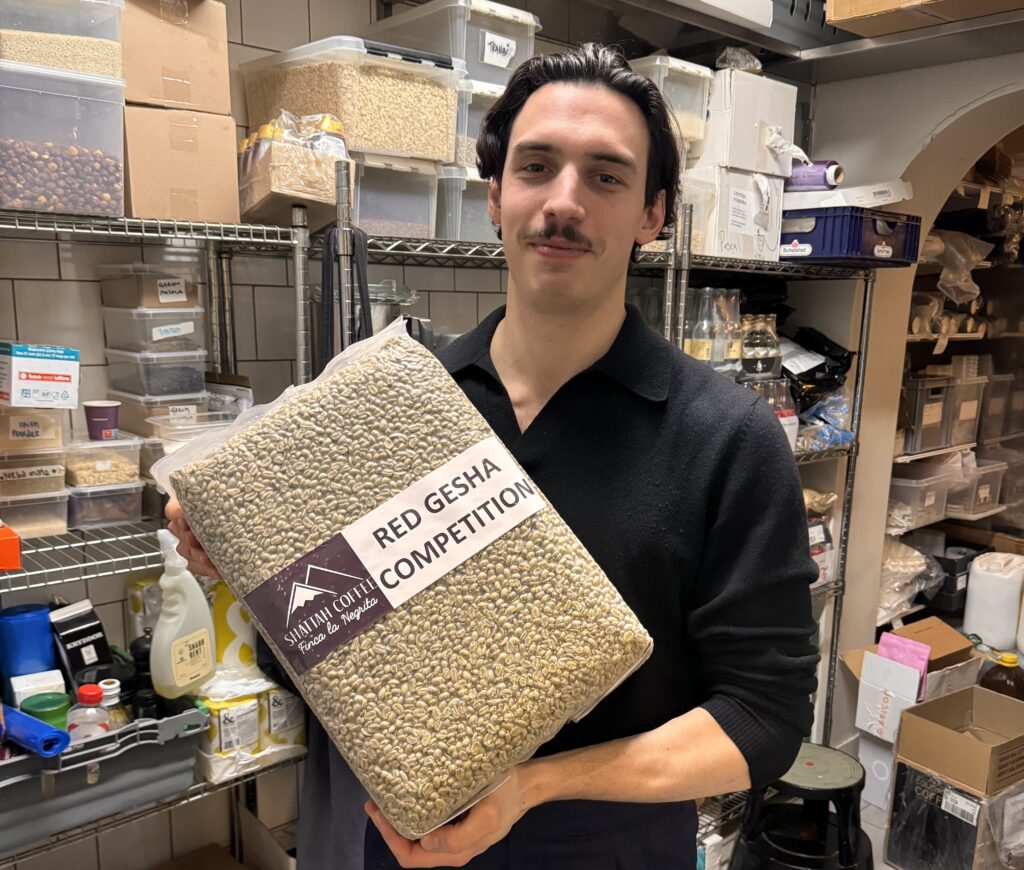
What are your passions and hobbies apart from coffee?
Although it’s been on pause for a while, producing music would be one of my bigger passions! It just got replaced with coffee, as work is coffee, and what I do outside of work is also… coffee! I am a very creative person and like to create/write/produce things. Whether it’s a tutorial about how to brew coffee, or write down my thoughts in a journal.
Although I don’t consider it a ‘’hobby’’ but rather a necessity to keep myself healthy, it is to regularly work out and do strength training. Other hobbies I have are to read books, which makes me think or learn about history, self-development, psychology or even business-improvement!
Cooking is also something I love to do, nothing beats a simple Italian dish made with high-quality ingredients!
What coffee challenges are you looking forward to? Any new projects or collaborations?
I’m looking forward to competing in the Swedish Barista Championships this autumn. It’s going to be hard, but it also means pushing myself to think outside the box, and improve my barista skills and public speaking! Also, I have a Red Gesha from Finca La Negrita that I think would make for a very tasty espresso!
For now, Nordic Brew Lab is in the startup phase. We just opened our first store in Malmö, Sweden and are just about to open our first showroom in Stockholm! I’m very excited for this, as we’re going to host events, coffee tastings and workshops there!

Quick Fire Questions for Håkan Sävlind:
Filter coffee or espresso-based?
Espresso.
Milk coffee or black coffee?
Black.
The most underrated coffee drink?
Piccolo.
The most underrated coffee brewer?
Dotyk Dripper.
What brewing method do you use at home?
V60 and espresso.
The number one place in Europe that every coffee geek should visit?
Am I allowed to say Pascal? 😂 Also, April Coffee Copenhagen!
Favourite city outside your own for a coffee tour and why?
In Sweden, that would be Gothenburg, because they have a few great places like A43 Coffee, Viktors Kaffe and Alkemisten, they use specialty, brew pour-overs and have good service. And outside of Sweden, definitely Kyiv 🇺🇦

